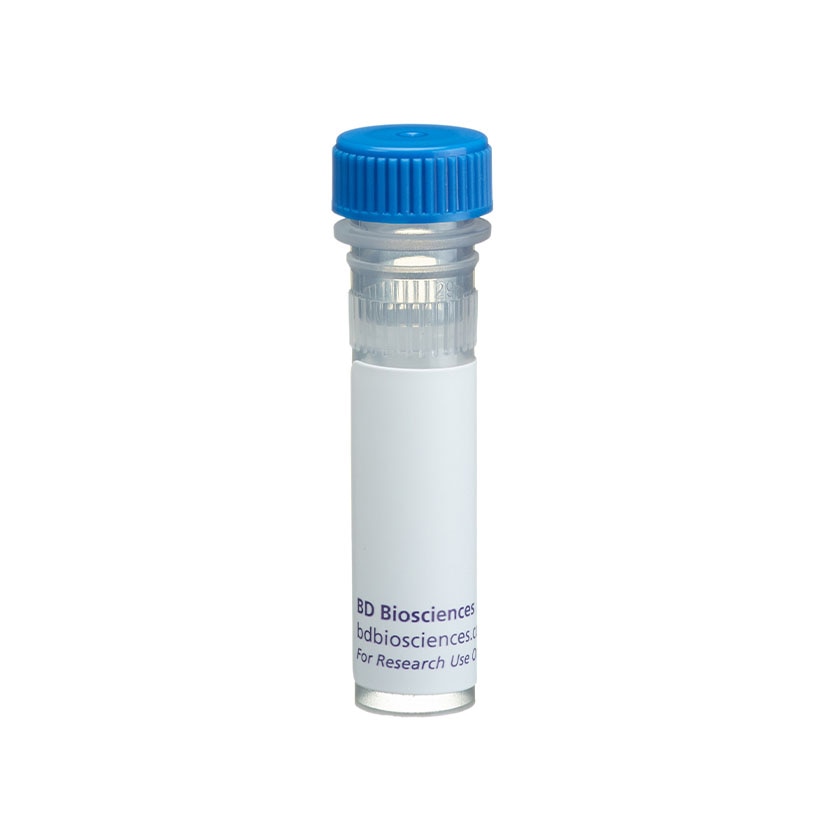Old Browser
Looks like you're visiting us from {countryName}.
Would you like to stay on the current country site or be switched to your country?


Regulatory Status Legend
Any use of products other than the permitted use without the express written authorization of Becton, Dickinson and Company is strictly prohibited.
Preparation And Storage
Product Notices
- Since applications vary, each investigator should titrate the reagent to obtain optimal results.
- Please refer to www.bdbiosciences.com/us/s/resources for technical protocols.
- Caution: Sodium azide yields highly toxic hydrazoic acid under acidic conditions. Dilute azide compounds in running water before discarding to avoid accumulation of potentially explosive deposits in plumbing.
- Sodium azide is a reversible inhibitor of oxidative metabolism; therefore, antibody preparations containing this preservative agent must not be used in cell cultures nor injected into animals. Sodium azide may be removed by washing stained cells or plate-bound antibody or dialyzing soluble antibody in sodium azide-free buffer. Since endotoxin may also affect the results of functional studies, we recommend the NA/LE (No Azide/Low Endotoxin) antibody format, if available, for in vitro and in vivo use.
Companion Products

.png?imwidth=320)
The HIS51 monoclonal antibody specifically binds to the rat Thy-1 antigen (CD90) expressed by hematopoietic stem cells, early myeloid and erythroid cells, immature B lymphocytes in the bone marrow and peripheral lymphoid organs, thymocytes, recent thymic emigrants (a subset of CD45RC- peripheral T cells), neurons, glomerular mesangial cells, endothelium at inflammatory sites, mast cells, and bone marrow-derived dendritic cells. Rat dendritic epidermal T cells (DEC) are Thy-1-negative. CD90 is a GPI-anchored membrane glycoprotein of the Ig superfamily which is involved in signal transduction. In addition, there is evidence in the mouse that CD90 mediates adhesion of thymocytes to thymic stroma. HIS51 antibody cross-reacts with the mouse Thy-1.1 alloantigen of the AKR/J and PL strains, but not Thy-1.2 found on most strains. In the mouse, CD90 is found on thymocytes, most peripheral T lymphocytes, some intraepithelial T lymphocytes (IEL, DEC), hematopoietic stem cells, and neurons, but not B lymphocytes.
Development References (12)
-
Campbell DG, Gagnon J, Reid KB, Williams AF. Rat brain Thy-1 glycoprotein. The amino acid sequence, disulphide bonds and an unusual hydrophobic region. Biochem J. 1981; 195(1):15-30. (Biology). View Reference
-
Chen-Woan M, Delaney CP, Fournier V, et al. In vitro characterization of rat bone marrow-derived dendritic cells and their precursors. J Leukoc Biol. 1996; 59(2):196-207. (Biology). View Reference
-
Dráberová L, Amoui M, and Dráber P. Thy-1-mediated activation of rat mast cells: the role of Thy-1 membrane microdomains. Immunology. 1996; 87(1):141-148. (Biology). View Reference
-
Elbe A, Kilgus O, Hünig T, and Stingl G. T-cell receptor diversity in dendritic epidermal T cells in the rat. J Invest Dermatol. 1993; 102:74-79. (Biology). View Reference
-
Groen H, Klatter FA, van Petersen AS, Pater JM, Nieuwenhuis P, Kampinga J. Composition of rat CD4+ resting memory T-cell pool is influenced by major histocompatibility complex. Transplant Proc. 1993; 25(5):2782-2783. (Biology). View Reference
-
He HT, Naquet P, Caillol D, Pierres M. Thy-1 supports adhesion of mouse thymocytes to thymic epithelial cells through a Ca2(+)-independent mechanism. J Exp Med. 1991; 173(2):515-518. (Biology). View Reference
-
Hermans MH, Opstelten D. In situ visualization of hemopoietic cell subsets and stromal elements in rat and mouse bone marrow by immunostaining of frozen sections. J Histochem Cytochem. 1991; 39(12):1627-1634. (Immunogen). View Reference
-
Hosseinzadeh H, Goldschneider I. Recent thymic emigrants in the rat express a unique antigenic phenotype and undergo post-thymic maturation in peripheral lymphoid tissues. J Immunol. 1993; 150(5):1670-1679. (Biology). View Reference
-
Ishizu A, Ishikura H, Nakamaru Y et al. Thy-1 induced on rat endothelium regulates vascular permeability at sites of inflammation. Int Immunol. 1995; 7:1939-1947. (Biology). View Reference
-
Kroese FG, de Boer NK, de Boer T, Nieuwenhuis P, Kantor AB, Deenen GJ. Identification and kinetics of two recently bone marrow-derived B cell populations in peripheral lymphoid tissues. Cell Immunol. 1995; 162(2):185-193. (Biology). View Reference
-
Nakashima I, Pu M-Y, Hamaguchi M, et al. Pathway of signal delivery to murine thymocytes triggered by co-crosslinking CD3 and Thy-1 for cellular DNA fragmentation and growth inhibition. J Immunol. 1993; 151(7):3511-3520. (Biology).
-
Paul LC, Rennke HG, Milford EL, and Carpenter CB. Thy-1.1 in glomeruli of rat kidneys. Kidney Int. 1984; 25:771-777. (Biology). View Reference
Please refer to Support Documents for Quality Certificates
Global - Refer to manufacturer's instructions for use and related User Manuals and Technical data sheets before using this products as described
Comparisons, where applicable, are made against older BD Technology, manual methods or are general performance claims. Comparisons are not made against non-BD technologies, unless otherwise noted.
For Research Use Only. Not for use in diagnostic or therapeutic procedures.
Refer to manufacturer's instructions for use and related User Manuals and Technical Data Sheets before using this product as described.
Comparisons, where applicable, are made against older BD technology, manual methods or are general performance claims. Comparisons are not made against non-BD technologies, unless otherwise noted.
Report a Site Issue
This form is intended to help us improve our website experience. For other support, please visit our Contact Us page.